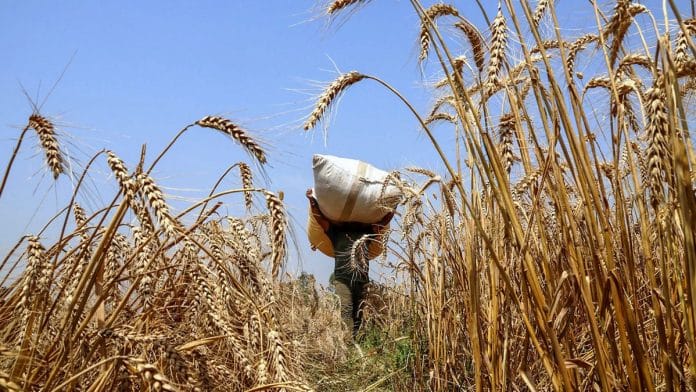Thank you dear subscribers, we are overwhelmed with your response.
Your Turn is a unique section from ThePrint featuring points of view from its subscribers. If you are a subscriber, have a point of view, please send it to us. If not, do subscribe here: https://theprint.in/subscribe/
The history of agriculture in India dates to the Neolithic period (about 12000 years ago). India ranks among the top countries with the highest net cropped area. Agriculture employs 45% of the Indian workforce & contributes 14 to 15% to the country’s GDP. Though the contribution of agriculture to GDP is steadily decreasing, still agriculture is demographically the broadest economic sector.
Despite the above scenario, agriculture sector is staring at a crisis. This is evident in the latest data which shows that the sector has grown by a meagre 1.4% in the last financial year. This systemic crisis has resulted from years of pursual of faulty policies & lack of political will in carrying out much needed reforms. In India, an overwhelming majority of farmers of farmers (86%) own land up to two hectares. The tragedy is all the policies are framed keeping in mind the miniscule minority of farmers who hold large land holdings & are economically well off. All the benefits are cornered by this minority leaving no option for the majority except to shift to other occupations as agriculture becomes economically unviable.
The first step to making agriculture viable is to organize the small & marginal farmers into cooperatives at village level on the lines of Amul. This will enable better targeting of inputs & also enable the farmers to reach a wider market. This coupled with the development of cold chain storage facilities & food processing hubs will result in better returns for the farm produce. Also, cooperatives must ensure all the land records pertaining to land holdings are digitized with proper data of owner cultivators & tenant cultivators. The cooperatives must ensure that all the inputs are made available to the member farmers at subsidized rates along with finance at low interest rates & deploying the latest technology tools for farming thus ensuring enhanced productivity. After taking in to account all the input costs, government must fix the minimum support price & allow the market to fix the prices for the trade. In case the market price for any crop is lower than the calculated minimum support price, the government must reimburse the difference amount. Further the working of Agriculture Produce Market Committees must be reformed to ensure transparent functioning. Government must use the procured food grains for intervening in the market to ensure price stability. To meet its obligations under the food security act, instead of free food grain distribution, government must transfer amount through direct benefit transfer based on the prevailing cost of living index.
Most of the above proposals were part of the now repealed farm laws. The intention was noble but wrongly implemented as agriculture is a state subject. The logical approach for the union government would have been to first ask its own state governments to implement the same. Based on this feedback, the union government should have discussed with opposition ruled states & convince them to implement the laws. As all the stakeholders would have been consulted, the scope for opposing the laws would have been minimal. The very fact that the laws were rushed through the legislative process without adequate consultations using brute majority resulted in their abrupt withdrawal.
Eminent economist Dr. Ashok Gulati suggested that an Agricultural Council be formed on the lines of GST Council with Agriculture Minister as Chairman & state Agriculture Ministers as members. Further Dr. Gulati has also suggested establishing a committee with two farmers from each state- one an owner cultivator & the other a tenant farmer. These committees will deliberate & settle all pressing issues affecting farmers.
By implementing the above steps, we would be giving agriculture it’s due & in the process realize our true potential of enhanced productivity, thereby restoring the glory of agriculture as a prime contributor to GDP.
These pieces are being published as they have been received – they have not been edited/fact-checked by ThePrint


